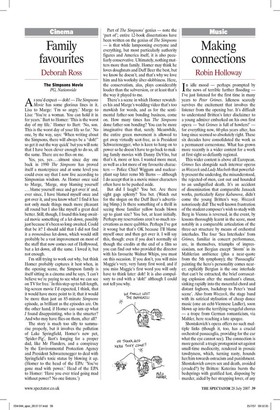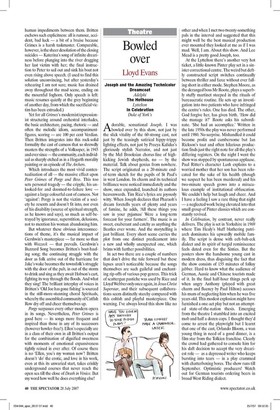Making connections
Robin Holloway 'Vidle mood — perhaps prompted by the news of terrible further flooding — I've just listened for the first time in many years to Peter Grimes. Idleness scarcely survives the excitement that involves the listener from the opening bar. It's difficult to understand Britten's later disclaimer to a young admirer embarked on his own first opera — 'but Grimes is full of howlers!' — for everything now, 60-plus years after, has long since seemed so absolutely right. These six decades have consolidated the work as a permanent cornerstone. What has grown more recently is a wider context for a work at first sight so defiantly regional.
This wider context is above all European. Grimes lies alongside such interwar operas as Wozzeck and Lady Macbeth that powerfully present the underdog, the misunderstood, the rejected-of-men, cast out and hounded to an undignified death. It's an accident of dissemination that comparable Janacek works, particularly Katya Kabanova, didn't come the young Britten's way. Wozzeck notoriously did! The well-known frustration of the student composer's wish to study with Berg in Vienna is reversed, in the event, by lessons thoroughly learnt in the score, most notably in a comparable articulation of the three-act structure by means of orchestral interludes. The four 'Sea Interludes' from Grimes, familiar in concert performance, are, in themselves, triumphs of impressionism, not Bergian except 'Storm' in its Mahlerian ambience (plus a near-quote from the 5th symphony); the Passacaglia' painting the hero's personality comes nearer; explicitly Bergian is the one interlude that can't be extracted, the brief corruscating explosion after the manhunt's climax, sinking rapidly into the mournful chord and distant foghorn, backdrop to Peter's 'mad scene'. Also from Wozzeck, the stage band with its satirical stylisation of cheap dance music (one an echt-Viennese Lndler), soon blown up into the terrifying vengeful chorus — a trope from German romanticism, via Mahler, here reaching a late apogee.
Shostakovich's opera offers no such multiple links (though it, too, has a crucial orchestral passacaglia, providing for the ear what the eye cannot see). The connection is more general: a tragic protagonist set against small-time mediocrity, rendered in prosaic tawdryness, which, turning nasty, hounds her/him towards ostracism and punishment. Shostakovich covers sex and death, avoided (evaded?) by Britten: Katerina bursts the bedsprings with gratified lust, disposing by murder, aided by her strapping lover, of any human impediments between them. Britten eschews such explicitness: all is rumour, accident, bad luck — a bit of a bruise because Grimes is a harsh taskmaster. Comparable, however, is the sheer desolation of the closing suicides — Katerina's song of infinite dreariness before plunging into the river dragging her last victim with her; the final instruction to Peter to sail out and sink his boat not even rising above speech. (I used to find this solution unconvincing, but after yesterday's rehearing I am not sure; music has drained away throughout the mad scene, ending on the mournful foghorn. Only speech is left: music resumes quietly at the grey beginning of another day, from which the sacrificial victim has been extruded.) Yet for all Grimes's modernist/expressionist structuring around orchestral interludes, the basic architecture, pacing, rhetoric — and often the melodic idiom, accompanimentfigures, scoring — are 100 per cent Verdian. Then Britten integrates into this rock-solid formality the cast of cameos that so shrewdly musters the strengths of a Volksoper, in 1945 and ever since — the community, each individual as sharply etched as in a Hogarth morality painting or an episode of The Archers.
Which introduces the most vivid contextualisation of all — the massive effect upon Peter Grimes of Porgy and Bess. This too sets personal tragedy — the cripple, his unlooked-for and doomed-to-failure love — against a large colourful cast of cameos. Not 'against': Porgy is not the victim of a society he resents and doesn't fit into, nor even of his disability (source of spiritual strength, as he knows and says), so much as self-betrayed by ignorance, superstition, delusions, not to mention his woman abandoning him But whatever these obvious interconnections of theme, it's the musical impact of Gershwin's masterpiece — far more so than with Wozzeck — that prevails. Gershwin's Buzzard Song becomes Britten's boat-hauling song; the continuing struggle with the door as folk arrive out of the hurricane for Jake's wake becomes the townsfolk's struggle with the door of the pub, in out of the storm to drink and sing as they await Hobson's cart, fighting its way through the floods. And what they sing! The brilliant interplay of voices in Britten's 'Old Joe has gone fishing' is sourced in the still-more-stunning choral Spirituals, whereby the assembled community of Catfish Row dry off and cheer themselves up.
Porgy surpasses every other modern opera in its songs. Nevertheless, Peter Grimes is good here — its songs more frequent and inspired than those in any of its successors (however howler-free!). Ellen's especially are in a class of their own in all Britten's output for the combination of dignified sweetness with moments of emotional expansiveness tightly reined in ever after. Of course there is no 'Ellen, you's my woman now'! Britten doesn't 'do' the erotic, and love in his work, even at this its unwaried start, takes crinkly underground courses that never reach the open sea till the close of Death in Venice. But my word how well he does everything else!









































 Previous page
Previous page